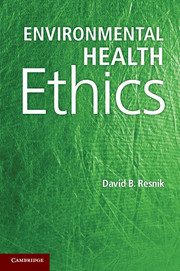Book contents
- Frontmatter
- Contents
- Figures and Tables
- Acknowledgments
- Abbreviations
- 1 Introduction
- 2 An Overview of Environmental Health
- 3 Ethical Theory
- 4 Toward an Environmental Health Ethics
- 5 Pest Control
- 6 Genetic Engineering, Food, and Nutrition
- 7 Pollution and Waste
- 8 The Built Environment
- 9 Climate Change, Energy, and Population
- 10 Justice and Environmental Health
- 11 Environmental health Research Involving Human Participants
- 12 Conclusion
- References
- Index
1 - Introduction
Published online by Cambridge University Press: 05 July 2012
- Frontmatter
- Contents
- Figures and Tables
- Acknowledgments
- Abbreviations
- 1 Introduction
- 2 An Overview of Environmental Health
- 3 Ethical Theory
- 4 Toward an Environmental Health Ethics
- 5 Pest Control
- 6 Genetic Engineering, Food, and Nutrition
- 7 Pollution and Waste
- 8 The Built Environment
- 9 Climate Change, Energy, and Population
- 10 Justice and Environmental Health
- 11 Environmental health Research Involving Human Participants
- 12 Conclusion
- References
- Index
Summary
Over an increasingly large area of the United States, spring now comes unheralded by the return of birds, and the early mornings are strangely silent where once they were filled with the beauty of bird song.
Rachel Carson (1962: 97)Rachel Carson launched the modern environmental movement in 1962 when she published Silent Spring, a book that documented the harmful effects of pesticides on birds and other nonhuman species. The book was serialized in the New Yorker prior to its full publication and was widely read after it was placed in the Book of the Month Club and became a best seller on the New York Times list. Carson had been aware of the potential hazards of pesticide use since the 1940s, but she became especially concerned when one of her friends had published a letter reporting the deaths of numerous birds on her property after aerial dichlorodiphenyltrichloroethane (DDT) spraying. In Silent Spring, Carson argued that DDT can cause reproductive problems, such as sterility, weak eggs shells, and embryo death in a variety of bird species, which leads to population decline (Carson 1962). She warned that, one day, the world would have a silent spring (i.e., no birdsongs) if steps were not taken to restrict the use of DDT and other pesticides. Carson discussed several examples of how pesticides can harm human beings, including a case in which farm workers had suffered toxic reactions from pesticide exposures. She also claimed that the chemical industry had spread false or misleading information about pesticide safety and that government agencies had not carefully examined industry claims.
- Type
- Chapter
- Information
- Environmental Health Ethics , pp. 1 - 8Publisher: Cambridge University PressPrint publication year: 2012



